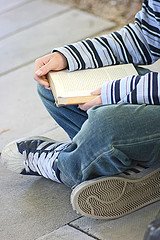 Children's Literature: A Reader's History, from Aesop to Harry Potter by Seth Lerer
Children's Literature: A Reader's History, from Aesop to Harry Potter by Seth LererChapter 14 alone is reason to have this book nearby! There are so many post-it notes in this book -- if only I could just absorb it. I have to return it to the library. Will I request it again to have it nearby. I want to be smarter about how I am reading and thinking about what I read. The insights of history are overwhelming. And this is not the only book that I keep requesting and reading and returning. Here's something from the introduction: "...(two ways of reading literature)...on the one hand, we may look for what it seems to us; on the other, we may look for what its author meant it to be...Part of the challenge for the literary critic, therefore, is to balance authorial intention and reader response. But part of the challenge for the children's literary critic is to recognize that texts are mutable-that meanings change, that different groups of readers may see different things, and that what grown-ups find as ordinary items of experience may transform, in the child's imagination, into monstrous brilliance.../page 3
 The Case For Make-Believe: Saving Play in Our Commercialized World by Susan Linn
The Case For Make-Believe: Saving Play in Our Commercialized World by Susan LinnAt the heart of this book are gripping stories of children at home, at school, and in a therapist's office using make believe to grapple with real-life issues from entering kindergarten to the death of a sibling. In an age when toys come from TV shows, dress-up means wearing Disney costumes, and parents believe Baby Einstein is educational, Linn lays out the inextricable links between play, creativity, and health, showing us why we need to protect our children from corporations that aim to limit their imaginations.
Jerry Griswold examines the unique qualities of childhood experience and their reappearance as frequent themes in children's literature. Surveying dozens of classic and popular works for the young—from Heidi and The Wizard of Oz to Beatrix Potter and Harry Potter—Griswold demonstrates how great children's writers succeed because of their uncanny ability to remember what it feels like to be a kid: playing under tables, shivering in bed on a scary night, arranging miniature worlds with toys, zooming around as caped superheroes, listening to dolls talk.























No comments:
Post a Comment